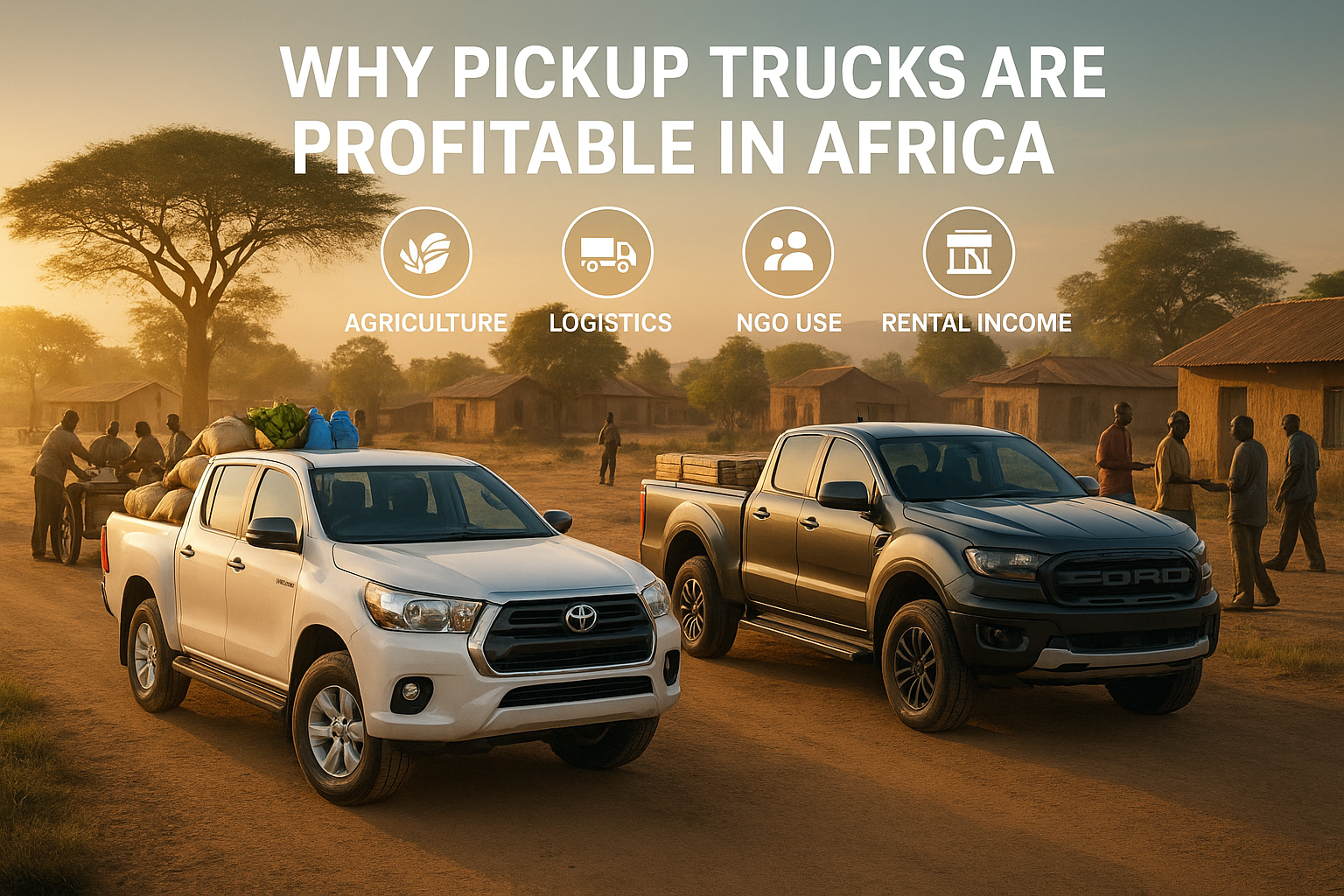Ever wondered why pickups are everywhere in Africa? From dusty farms to urban roads, from rugged construction sites to NGO convoys, pickups rule the terrain. But beyond just being tough and dependable, owning a
pickup truck in Africa can actually be incredibly profitable. Let’s break it down.
High Demand in Agriculture and Rural Transport
Africa is still largely driven by agriculture, with over 60% of the population involved in some form of farming. Whether it’s transporting produce, carrying supplies, or ferrying workers to the fields, a brand-new pickup is an agricultural powerhouse. Especially in rural areas where roads are often unpaved or damaged, a sturdy truck is often the only vehicle that can get through.
According to
Statista,
Africa’s pickup truck market is projected to reach US$733 million in 2025, with average unit prices around US$33,000. That growth isn’t just from city dwellers; it’s being driven by farmers, traders, and rural cooperatives who see pickups as vital tools, not just vehicles.
Profit Potential in Commercial Use
Pickups aren’t just for farming. In Africa’s rapidly growing urban economies, they’re crucial for small-scale logistics, construction, mobile services, and even ride-hailing for goods.
Let’s say you own a Toyota Hilux. You can rent it out for short-distance deliveries, lease it to NGOs or construction crews, or even start a micro logistics business. Thanks to digital platforms and WhatsApp networks, pickups are always in demand for hourly or daily rentals. That means passive income streams are totally possible, especially in transport-scarce regions.
In many countries, owning a pickup unlocks entrepreneurial opportunities far beyond just driving it yourself.
Strong Resale Value
One of the most overlooked benefits of owning a pickup in Africa is its strong resale value. Take the Toyota Hilux, for example, Africa’s bestselling truck. According to
Business Tech, it retains around 73% of its original price even after driving over 100,000 km. The Ford Ranger trails close behind at 69% resale value over similar mileage.
This is no accident. The
Toyota Hilux is widely seen as indestructible and reliable, especially in off-road and low-maintenance environments. You’ll find resale markets across Nigeria, Kenya, Ghana, and South Africa thriving with second-hand Hiluxes fetching great prices.
That kind of resale value means owning one is less of a cost and more of an investment.
Durability and Low Maintenance Costs
Durability is king in Africa, and pickups like the Hilux, D-Max, and even the F-150 pickup (in some markets) are legends in this regard.
Thanks to their simple mechanics, diesel-powered engines, and availability of local parts, pickups can run for years with minimal upkeep. In countries like Zambia and Malawi, many farmers and construction workers prefer older pickups for their longevity and low operational costs.
Even newer models boast impressive durability. For example, the Hilux comes with long service intervals and is designed to withstand high temperatures, dust, and poor fuel quality, all while still offering comfort and tech for modern users.
Government and NGO Demand
If you’re thinking of buying a brand new pickup as a personal vehicle, here’s something to consider: government tenders and NGOs are always looking to lease or buy pickups.
Organizations such as Riders for Health, WHO field offices, and government agriculture departments consistently need tough, reliable vehicles that can access remote areas. They often prefer local pickup owners because of accessibility and response time.
That means if you own one, you might have leasing opportunities to NGOs and government bodies for specific missions, or even regular contract work. This demand keeps the resale and rental value of pickups high, and keeps them in service for longer periods.
Fuel Efficiency and Modern Technology
Pickups have evolved. The Toyota Hilux, for instance, now comes with 2.4L and 2.8L turbo diesel engines that consume about 7.6 to 8.5 liters per 100 km, which is very reasonable for a vehicle of its size and power.
And if you compare that to an F-150 pickup, which dominates the US market, the Hilux performs better in terms of fuel economy while still offering modern features like Apple CarPlay, touchscreen dashboards, rearview cameras, and built-in GPS systems. This makes it not only efficient but enjoyable to drive, especially on long hauls.
If your pickup is doubling as your business tool and your daily driver, efficiency is critical, and modern pickups deliver just that.
Financing and Import Opportunities
Don’t let the upfront cost fool you; financing and import structures in many African countries are becoming more flexible.
In countries like Ghana, Kenya, and Nigeria, dealerships now partner with banks and microfinance institutions to offer monthly or seasonal payment plans. That means you can own a brand new pickup with a manageable deposit and flexible terms that fit your business or farm income cycles.
On the import side, several countries are removing red tape to encourage investment in durable vehicles. If you can import a used Ford F-150 pickup from the US or a nearly
new Toyota Hilux from the UAE or Thailand, you might be able to get it for a steal and flip it for a profit locally.
Conclusion
In Africa, a pickup isn’t just a set of wheels. It’s a business enabler, a community workhorse, and a personal asset with appreciating potential. Whether you’re hauling cassava from the village or running logistics in the city, a pickup gives you options, real, money-making options.
So if you’re still on the fence, ask yourself: Do you want a vehicle that depreciates… or a Toyota Hilux or
brand new pickup that could earn you income and sell for a premium down the line?
It might be time to join the smart, rugged, and profitable side of African mobility.


